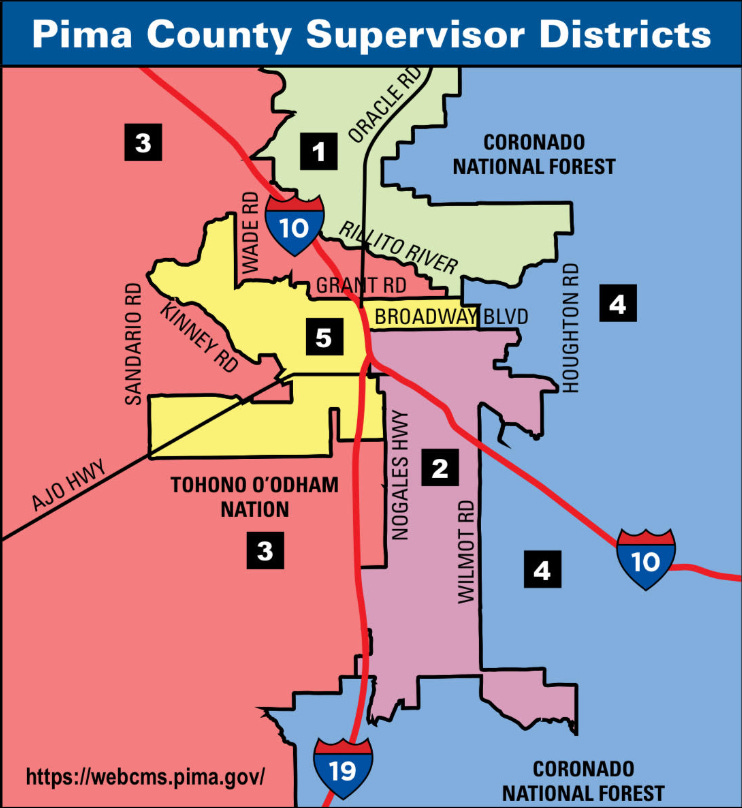The Daily Agenda: Allen wants to get county "on the right path"
Jennifer Allen has high-level ideas and on-the-ground experience ... She says that's what sets her apart in the county supervisor race ... Street-racing surveillance incoming.
Jennifer Allen wants to take the 25 years she spent working to “make people’s lives better” and turn it into good policy for Pima County.
She’s running for the county supervisor seat in District 3, which former Supervisor Sharon Bronson held for many years until she resigned after an injury last winter. Now, Allen and five other candidates are vying for the seat in a wide-open race without an incumbent.
So far, Allen’s campaign has amassed one of the biggest fundraising hauls of any candidate for county offices. The $85,000 she raised is far more than any of her competitors for the District 3 seat. She also is picking up endorsements from local politicians like Tucson Mayor Regina Romero.
Allen sat down with the Tucson Agenda last week to talk about why she’s running, what she hopes to accomplish if she’s elected, and why voters should choose her.
Right now, she’s a “dedicated mamá of a bilingual, TUSD fifth-grader.” Before that, she was the executive director of the ACLU of Arizona, a leader at the League of Conservation Voters, and the founder of the Border Action Network.
She says the “unique skill set” she developed at those organizations is what makes her “stand out” among the Democratic candidates.
“I believe that I have the experience, the knowledge, the vision, and the collaborative leadership style that is really needed to navigate the complex situations and the complex problems that we’re facing,” she said.
She spent years working with the “breadth of communities” in the “massive” and “diverse” District 3. That familiarity has grown as she and her campaign staff knocked on 2,500 doors “from midtown Tucson, going up then to Flowing Wells, Amphi, Marana, out to Ajo, the Tohono O’odham Nation, border communities, Arivaca, Amado, Three Points,” as she described it.
“There is no one-size-fits-all agenda for this district, or kind of platform that’s going to be the same across the board,” she said. “I think that’s one of the things that makes this district so challenging, but also interesting and rewarding.”
As a county supervisor, her top priorities would include long-term plans for climate resilience, mitigating the housing crisis, and finding alternatives to incarceration.
She’d also improve transportation in the sprawling District 3, where rural roads are a lifeline for many residents and seniors depend on the Regional Transportation Authority to get them to Tucson for doctor’s appointments and other necessities.
One of her big issues is what she sees as the county’s “over-reliance on incarceration.” The increase in deaths at the county jail in recent years was “one of the things that really got me looking into this role of the board of supervisors.”
Instead of relying so much on sending people to jail, the county could use the City of Tucson’s 3-1-1 call system as a model for responding to situations that don’t necessarily require law enforcement, such as substance abuse or a person going through a mental health crisis.
Still, if somebody committed a serious crime, then “you need to have the justice system involved.”
She supports a wide array of steps to protect the environment, such as increasing the use of solar energy and water conservation. She’d be “excited to step in and continue to provide some leadership and support” for the county’s long-term plans, as well as incorporating more of the “low-hanging fruit” like making the county’s vehicles and buildings more energy-efficient.
When it comes to the housing crisis, “we simply need more housing,” she said.
“We need more housing overall. We need more housing that is affordable,” she said. “Then we also need to think about housing stability, which is about how do we stabilize rent so that rent is not increasing at a level that is not commensurate with wage increases.”
She also pointed to the need to increase homeownership and prevent evictions and foreclosures, as well as enforcing building codes so renters have clean, safe places to live.
“One of the things that as we’ve been out door-knocking that has been really disturbing is seeing some of the horrendous conditions of some of the rental properties in District 3,” she said.
The district covers a vast stretch of the Arizona-Mexico border and Allen says she knows the border is “home” to many families and key to Arizona’s economy. As a county supervisor, she would counteract the distorted view of the border that so many across the country see, as well as make sure asylum seekers get the support they need while they’re in Tucson.
Her philosophy about the role of county supervisor comes down to “protecting and understanding both the needs and opportunities of our people and our place.” She says she knows how to develop concrete plans and get people involved.
“Then also thinking about the implementation of it, and how do we make sure that we’re hitting the mark and that we’re doing it over and over again and we’re on the right path and we know how to course correct.”
Before she can bring that philosophy to the Board of Supervisors, she’ll have to face Miguel Cuevas, Edgar Soto, and April Hiosik Ignacio in the July 30 primary. The winner will go on to face Republican Janet Wittenbraker and independent Iman-Utopia Layjou Bah in the November general election.
We’ll be back next week with another candidate interview. If you’re enjoying learning about the candidates here, consider upgrading to a paid subscription.
This story was supported by the Local News Initiative of Southern Arizona, a fund of the Community Foundation for Southern Arizona.
Off the beaten path: The University of Arizona’s Pathways to Teaching program helps students who might not otherwise have the resources earn a bachelor of arts in education in 17 months, the Arizona Daily Star’s Jessica Votipka writes. The program launched in January 2020 and includes 60 hours of coursework, plus team and solo teaching in the classroom. Sunnyside was the first school district to seek teachers through the program, which now partners with 10 other districts that help identify potential teachers within their communities.
Call to protest: Defense attorneys for four people arrested during a November protest against the Israel-Hamas war say the Pima County Sheriff’s Department violated their clients’ religious freedoms, Arizona Public Media’s Hannah Cree reports. The defendants’ motion to have their charges dropped says they’re “persons of sincere religious conviction who were motivated by their religious beliefs.” The group includes an ordained minister, two practicing Christians and a Jewish man who is working towards becoming a Rabbi.
Catching them early: The League of Women Voters of Greater Tucson are visiting schools to encourage newly 18-year-olds to register to vote in the November presidential election, Arizona Sonoran News’ Refugio Del Cid writes. The group works with teachers to arrange presentations and videos of voting history and include examples of impactful changes brought on by voting. Students also have the opportunity to register to vote during the presentation, with the league saying its been active this past year to reach as many high school seniors as possible before May’s graduation ceremonies.
Second chances: Pima County Attorney Laura Conover participated in a panel discussion last week, encouraging companies to hire people who were previously incarcerated, the Tucson Sentinel’s Paul Ingram writes. Conover joined retired federal magistrate judge Charles Pyle, co-founder of Second Chance Tucson; Moniqua Lane, owner of the Downtown Clifton Hotel; and Nathan Dixon, owner of Heroes Carpet Cleaning.
“It’s common sense,” Conover said. “From a policy perspective, if we know that some 40,000 people will come back home to us out of the Arizona Department of Corrections then if we care about public safety, we want them to thrive.”
Asphalt agreement: The Town of Sahuarita will review a proposed development agreement today that could end Vulcan Materials’ efforts to put a hot-mix asphalt plant next to Quail Creek, the Green Valley News’ Dan Shearer reports. The agreement would let Vulcan continue to use the land “as guaranteed by a 2000 development agreement” with the company withdrawing its request for a conditional use permit to operate the hot-mix asphalt plant. Vulcan would also relinquish the right to operate the plant “in perpetuity.”
Racing revisited: The Tucson City Council is updating the public tomorrow on their fight against illegal street racing, KVOA’s Zachary Jackson reports. In November, the council learned about several new types of technology that could help, including pan-tilt zoom cameras, gunshot detection system and automated license plate readers, which range in price from $125,000 to $300,000. City Manager Mike Ortega is expected to weigh in on the technology the city will need and anticipated cost.
219: The number of responses to our reader survey so far. Take a moment and fill it out. It’s really short and it helps us understand our audience better. Plus, you can give us feedback on how we’re doing. Thank you!









Thanks for the profile on Jennifer Allen. As a District 3 voter, I want to learn as much as possible about all of the candidates.